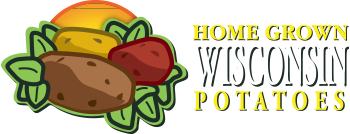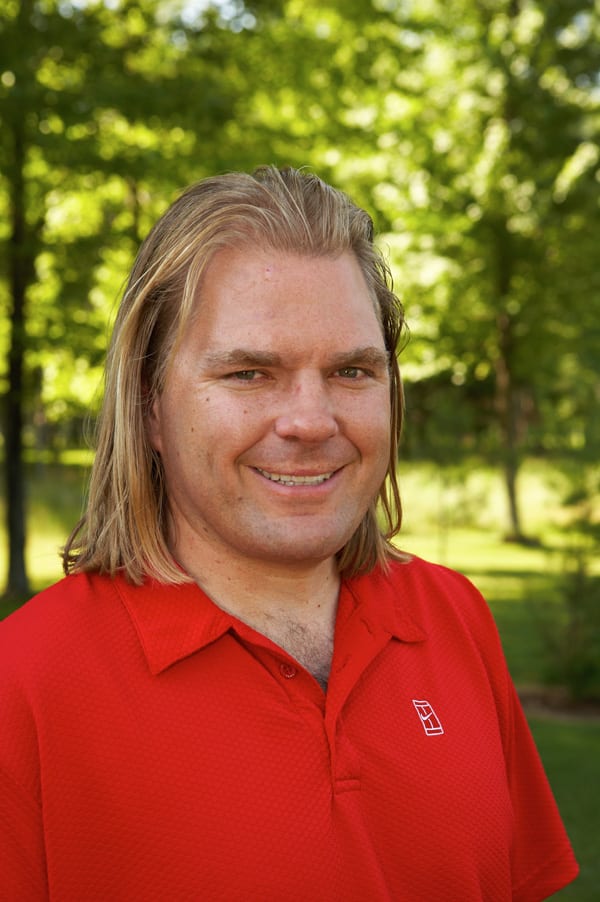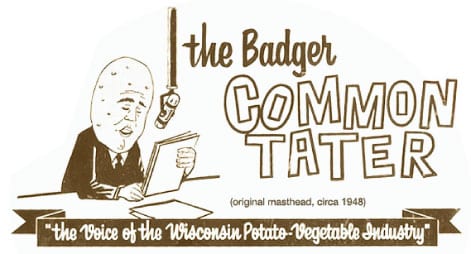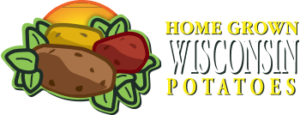
If you were to describe Andy Diercks, Coloma Farms, with one phrase, it would be “down to earth” because he has a very unassuming, quiet manner that far belies the depth of his experience in several areas of the agriculture world.
While Andy will be the first to tell you that he does not know the art of growing potatoes as well as his father, Steve, he uses his engineering background continually to improve the efficiency of the farm. He is often behind the scenes, providing technical support and planning for changes that will make better use of equipment, inputs or employees.
He and Steve both actively participate in Ag industry legislative, educational, research and promotional activities to further the cause of Wisconsin’s potato and vegetable growers.
When Andy was elected President of Wisconsin Potato & Vegetable Growers Association (WPVGA) in 2002, he became the fourth generation in his family to serve in that position. Andy’s father, Steve, served as WPVGA President in 1989; Steve’s father, Robert Diercks, served as WPVGA President from 1975-76 and Robert’s father, Ben Diercks was the WPVGA’s first President from 1948-49. Robert Diercks passed away in 1994.
A strong proponent of the potato and processing vegetable industry, Steve and Andy’s family operation, Coloma Farms, produces potatoes and other crops on 2,700 acres in Waushara and Adams counties.
Steve and Andy are highly regarded for their support of industry research, particularly on sustainability and conservation issues, again, both of which are long-held, strong family influences.

The sustainable farming practices used by the Diercks, incorporate the latest University of Wisconsin research, much of which was conducted on the Hancock Ag Research Station followed by field trials on cooperating farms, including Coloma Farms. Meanwhile, the farm’s office proudly displays two environmental stewardship awards received from both state and national organizations.
One of the areas of highest concern to Andy is groundwater, “We need to be looking at the whole area that we live in.” says Andy, who also serves on the State Department of Agriculture Board. “We all depend on our groundwater, and ultimately it’s our job to do everything we can to protect it.”
To pursue this end, Andy and others are actively collaborating with UW researchers to discover ways to use water more efficiently throughout their entire farm operation. These researchers have shown that growers can withhold irrigation water from some crops, such as soybeans and corn, at non-critical growth stages without reducing yield. For other water-dependent crops, they use innovative software that regulates irrigation, precisely meeting crop demands, therefore reducing water use.
Both Diercks are also collaborating with UW to install monitoring wells that continuously track groundwater fluctuations and help predict the impacts of climate and irrigation on nearby streams and lakes. “This will be a lifelong process,” says Andy. “However, if we all work together, we can ensure a sustainable future for everyone in the Central Sands region.”
Many people confuse the terms ‘sustainable’ with ‘organic’. While both are ecologically sensible practices, they are judged by a distinct set of standards. How would you describe sustainable farming, particularly in relationship to commercial growers and why do you believe in it?

Sustainable farming means many different things depending on the audience. I think our (WPGVA) definition would be producing food while balancing the environmental, social and economic challenges that we face on our farms.
We try to make responsible choices on a daily basis knowing that often there are multiple right answers and other times there really are not any right answers.
If you think about the consequences of your choices on the environment, your employees and your neighbors, then I think you are on the path to sustainability. To move forward successfully on that path, your farm needs to be profitable so you can make hard choices when necessary.
Organic production is one way to move down this path but it is certainly not the only way, nor is it necessarily the best one.

Has sustainability always been a focus of Coloma Farms, Inc. and what part have you played in strengthening this focus?
Long before I was born, our farm, and those of other WPVGA members, have always been concerned with farming sustainably. They did not have the fancy name we associate with it now but through our research partnerships with the UW coupled with a proactive approach both growers and WPVGA always endeavored to grow in the best and most responsible manner possible. I play the same role that my father, Steve, plays and grandfather, Robert played. I use our on-farm experience along with advice from the best researchers and associate partners to best address the challenges we face.
How do you select the crops you grow and varieties within those crops so that you know they are sustainably suited to the local climate, soil, pest and diseases being grown?
We can grow a multitude of different crops in the Central Sands given our climate and access to groundwater for irrigation. We try to utilize as much market information as possible so that first and foremost, we remain profitable so that economic stress cannot work against making the right choices on social and environmental factors.

We joined United Potato Growers Cooperative to tap into the market information they provide and to be part of a healthy fresh market for our industry.
From there, we balance our economic risk with processed chip and frozen potato varieties that are under contract.
Lastly, we are very fortunate to have several options for our rotation crops. We enjoy a great working relationship with Seneca Foods on a long-term lease of several hundred acres where they grow canning crops.
We work together with neighbors like Heath Farms, Paul Miller Farms, Heartland Farms and Milk Source on a variety of different crops to balance the rest of the rotation. In any given year, we have eight to ten different crops and eight to ten different varieties of potatoes on the farm. It works well from a disease, pest and environmental standpoint. Plus, we enjoy working with the neighbors to help them become more successful.
What integrated crop management practices do you use to insure sustainability, especially in regards to crop rotation and specific cultivation techniques?
We try to maintain a minimum of a three-year rotation for our cropping systems. If we can stretch it to four years, the environmental consequences are more positive but sometimes the economic options get tougher.

We do not have any special recipe for the practices we use. We use practices we have learned that work well from our researchers, neighbors or our own experiences.
Typically, we fumigate, then deep rip the fall before we plant potatoes, using GPS steering to rip right under where the potato hills will be located to maximize rooting depth, increase available water and decrease nutrient leaching.
We zone or strip fumigate on the newer varieties that can tolerate it so we use half as much fumigant. We are also working with Ann MacGuidwin at UW-Madison on a variable rate fumigation trial to see if we can further reduce our use of that product.
We hill only one time using reservoir tillage to minimize water movement in the field and we spoon-feed our nutrients to minimize leaching potential.
Currently, we are experimenting with moisture sensors to supplement our ET based irrigation scheduling and are starting to use ‘variable rate irrigation’ on some fields as that technology is developing.
On our rotation crops, we use strip tillage prior to planting whenever possible to protect small plants from wind damage.
People are also an important factor in the sustainability equation, mainly since training employees in the principles you support, is expensive and time-consuming, making every employee a valuable asset. How does your operation attract and maintain quality employees?

We are very fortunate in that all of our fields are adjacent to one another. From the north end of the farm to the south end is less than two miles and it is much smaller than that in the east-west direction. That has allowed us to be quite efficient in both employees and equipment.
We have seven full time employees, including Dad and myself. Dad’s cousin Mike has been with us almost since the farm moved down here from Antigo in the early 1960’s.
We have a father and son team of Walt and David that have been with us as long as I can remember, or in Dave’s case, since he finished high school.
Joe has been with us for about eight years and we just brought on a new full time employee last year, Frank, who we hope will stay as long as he is willing.
All of our employees are hard workers and get along great together so we do whatever we can to keep them here. We have good health and dental insurance programs for our workers and their families. We also encourage them to participate in any outside training or community events in which they are interested.

We try to be respectful of how hard we work everybody and allow plenty of time off for family events and vacations. We are very fortunate to have such a dedicated full time crew and the bulk of our part time crew returns year after year.
Eliminating waste is an important aspect of Ag sustainability. What are your best practices in this area, largely in regards to crop waste and matter?

This has become a very difficult area for agriculture in general to measure but like most farms, we reuse and recycle as much as we can. We are a long ways from being a ‘zero landfill’ company but are getting there since we recycle all the glass, aluminum, corrugated cardboard and other materials that our waste management company will take and recycle our pesticide containers and drain oil.
We recycle any metal that cannot be reused and we work with our associate division partners to recycle any other specialized equipment or materials that do not fit into the normal waste management channels.
The sustainability of commercial agriculture overall heavily depends on a healthy legislative environment that understands and supports agriculture. How has your operation worked to foster support from legislative entities and educate them to agricultural needs?
Dad and I try to stay active in industry boards and committees at both the state and national levels. We also try to tell our story to the public so we can help educate them towards understanding that growers are sustainable and environmentally minded.
I was fortunate to be part of a group of growers that participated in a video for “Into the Outdoors” an Emmy award-winning show that teaches kids how things work. We ‘walked’ two children through how potatoes are grown, harvested and delivered to their plates.

I was also part of the long but determined effort that resulted in the Spudmobile, WPVGA’s new educational vehicle that travels the Midwest sharing the history and vision of the Wisconsin potato and vegetable industry. It was great to see the growers, the Associate Division, the Auxiliary, and the WPVGA staff work hand in hand to make that vehicle possible.
We also actively meet with legislators, regulators, students, and other groups to help them understand that we are all trying to make the right decisions on our farms. Our primary focus now is working through the Water Task Force and our Government Affairs committee to develop high capacity well legislation amiable to all potato and vegetable growers.
Lastly, I could not be more proud of the countless time, money, and food donated to our local communities by our farm, our fellow growers, our UW partners, the Auxiliary and our Associate Division partners. The recent Feed My Starving Children event that our industry started four years ago and supports annually is a perfect example. There is no better way to show our neighbors and the world that we care than by giving of ourselves when others need help.



